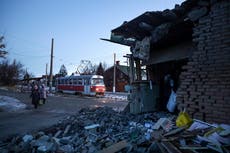Putin’s latest battle: Why Russia is fighting so hard to claim Ukrainian town of Soledar
The eastern mining outpost is of symbolic and strategic significance, but claims of control of the town are disputed by Ukraine
The fate of the devastated salt-mining town of Soledar in eastern Ukraine hangs in the balance with Ukraine saying its forces were holding out against a furious Russian onslaught in one of the fiercest and costliest recent ground battles of Moscow’s invasion.
As fierce fighting in the Ukraine war continues, Russia has claimed what it believes to be a significant symoblic and strategic victory by announcing the capture of Soledar in .
Combatants from the notorious Wagner Group of mercenaries, led by Vladimir Putin ally Yevgeny Prigozhin, declared late on Tuesday that they had taken control of the eastern mining town in the Donetsk region, home to what is said to be Europe’s largest salt mine and, prior to the war, a population of around 10,000 people.
“Wagner units took control of the entire territory of Soledar,” Prigozhin said in an audio statement reported by Russian news agencies.
“A cauldron has been formed in the centre of the city in which urban fighting is going on.”
Russia‘s defence ministry has since claimed that its airborne units have Soledar surrounded from the north and south and that its air force has hit Ukrainian targets in the town.
However, Ukraine has disputed the brag, with Serhiy Cherevatyi, a spokesperson saying.: “The town is not under the control of the Russian Federation,” he said. “There are fierce battles going on now. There is a complicated situation.”
Footage emerging from the scene has shown a Russian ammunition depot being blown up and there is little doubt that its forces have sustained heavy losses, with the fighting playing out on devastated streets and across treacherous muddy fields.
The Institute for the Study of War think-tank has said that Russia’s forces are up against “concerted Ukrainian resistance” in the area, adding: “The reality of block-by-block control of terrain in Soledar is obfuscated by the dynamic nature of urban combat... and Russian forces have largely struggled to make significant tactical gains in the Soledar area for months.”
Speaking in his nightly address to the nation on Monday, Ukrainian president Volodymyr Zelensky acknowledged that the situation in Soledar was “difficult” but insisted Russia would eventually be driven from the Donbas.
“And what did Russia want to gain there?” he asked his audience.
“Everything is completely destroyed, there is almost no life left. And thousands of their people were lost: the whole land near Soledar is covered with the corpses of the occupiers and scars from the strikes. This is what madness looks like.”
Hanna Malyar, Ukraine’s deputy defence minister, said of the situation on the ground on Tuesday: “The enemy disregards the heavy losses of its personnel and continues to storm actively.
“The approaches to our positions are simply strewn with the bodies of dead enemy fighters. Our fighters are bravely holding the defence.”
Pavlo Kyrylenko, Donetsk’s Kyiv-appointed governor, said the attacks on Soledar and nearby Bakhmut had been relentless, commenting: “The Russian army is reducing Ukrainian cities to rubble using all kinds of weapons in their scorched-earth tactics.”
Were Russian forces to definitively secure Soledar, it would mark its first meaningful territorial gain since last summer.
Russia has been forced into several humiliating retreats in the north, northeast and south since then as Ukraine mounted an impressive counter-attack in the autumn.

Putin is under growing pressure at home to deliver results as the war moves towards its one-year anniversary on 24 February, having proven to be anything other than the formality he appears to have expected at its outset.
Assuming it did secure Soledar, the town lies less than 10 miles northeast of the city of Bakhmut where fighting has raged for months in one of the war’s bloodiest battles - dubbed the “meat grinder”. If Russia is able to capture Soledar, it would likely be able to use that position to intensify its assault on Bakhmut. That would be in the hope of opening a path towards other cities like Kramatorsk and Sloviansk.
Controlling Soledar, which lies around 11 miles north of Bakhmut, would grant the Russians a new platform from which to renew its assault on that city and end a drawn-out battle that has become known as “the meat grinder” due to the extent of the casualties sustained by both sides.
Finally, the salt and gypsum that could be plundered from the historic mines of Soledar, owned by state-owned enterprise Artemsil, would represent a commercially lucrative asset to those who control them – while their subterranean caverns could be repurposed as a handy weapons store, protected from aerial bombardments by virtue of being below ground.
The mines have reportedly produced more than 280 million tonnes of salt since they were opened in the late 19th century, which was exported to 20 countries until the war began and reach a depth of 200-300 metres, encompassing tunnels measuring a combined 186 miles.
A US official said last week that Wagner’s Prigozhin was interested in taking control of the mines near Bakhmut. Prigozhin has himself spoken of Bakhmut’s “underground cities”, saying they can hold troops and tanks.
Additional reporting by Reuters and Associated Press
Join our commenting forum
Join thought-provoking conversations, follow other Independent readers and see their replies
Comments

Bookmark popover
Removed from bookmarks